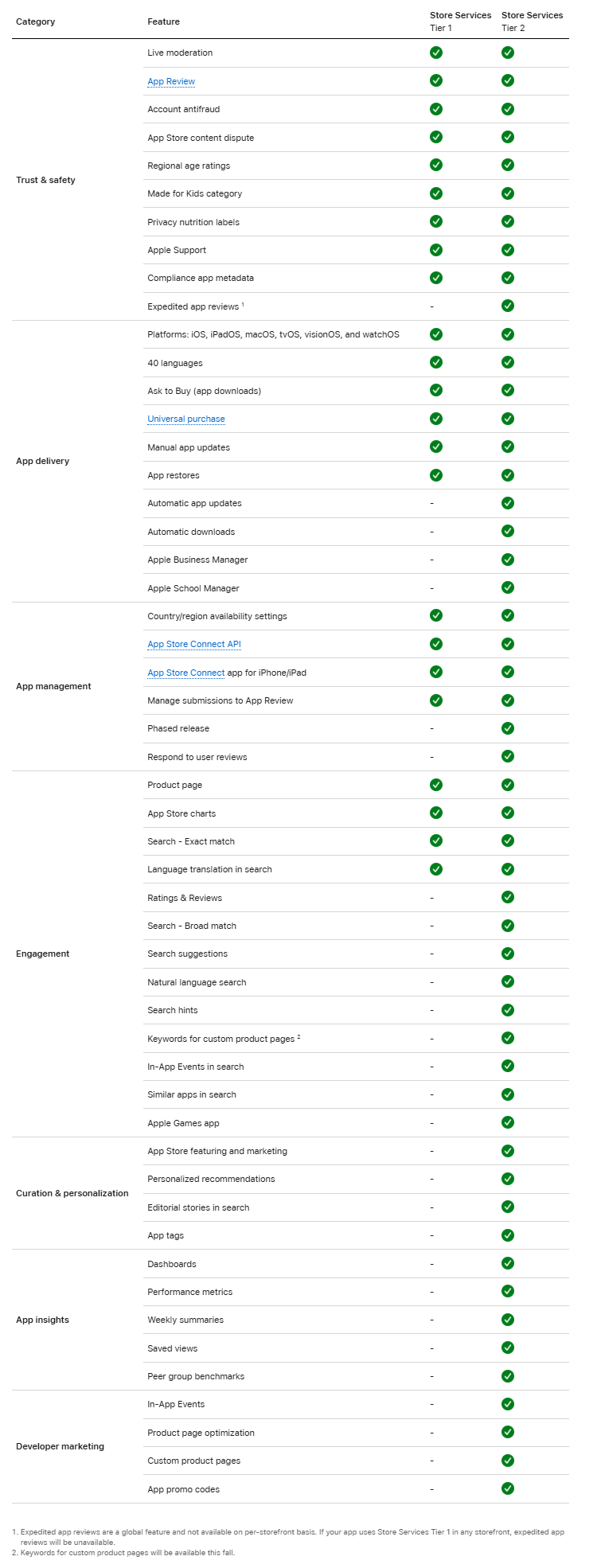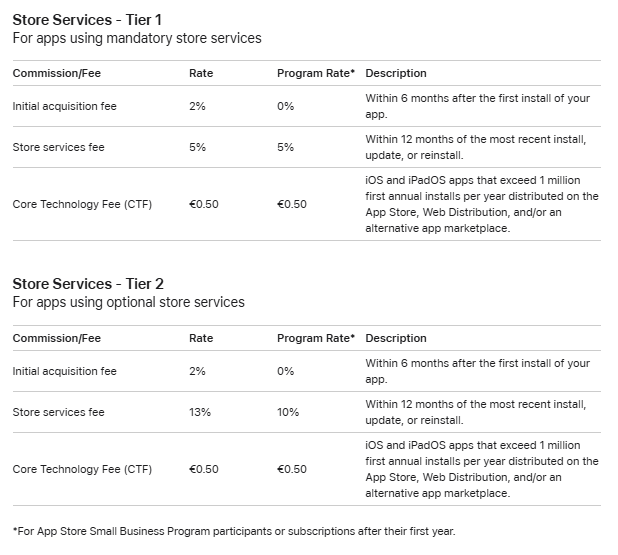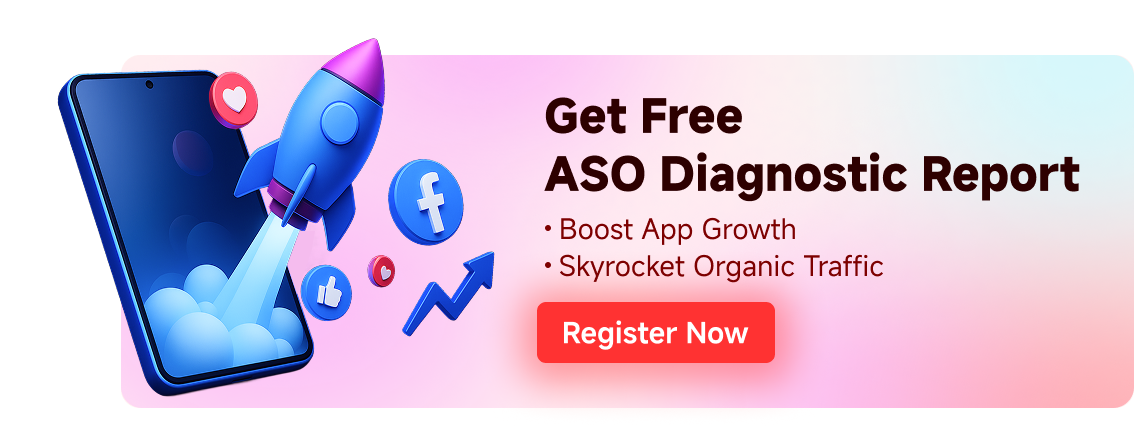
Loading...
Free consultation with ASO specialists
Doing ASO for the first time or have no idea how to carry out targeted optimization of your app?
We offer one-on-one customized services provided by app marketing specialists
App Store's "Recommendation Mechanism" is Revealed for the First Time: Developers Welcome a New Era of Self-Control?
2025-07-11
Under the continued pressure of the European Union's Digital Markets Act (DMA), tech giant Apple has made a historic concession. The recommendation mechanism of the App Store, which has long been shrouded in mystery and is the core traffic code that determines the life and death of applications, has finally been revealed by Apple itself and clearly presented to developers.
Apple has published a document titled " Store Services Tiers " the document, which appears to be technical in nature, actually represents a significant shift: for the first time, it breaks down and defines the complex mechanisms that affect app "discoverability" and clearly divides them into different service levels, directly linking them to the commission rates chosen by developers. This is not only a direct response to EU regulatory pressure, but also marks a key step towards algorithmic transparency for the App Store.
The mystery of Apple's recommendation mechanism is finally revealed
In the past, developers were like groping in a dark forest. Can the application get the favor of Apple's editor and be recommended on the home page? Can it rank first when users search for related keywords? These core issues concerning the exposure and download volume of applications are often hidden in Apple's opaque algorithms and editorial decisions. Developers invest a lot of resources in marketing, but often feel that they are working twice as hard for half the result because they lack an understanding of the core recommendation logic.

The release of the 《Store Services Tiers》 document completely changed this situation. Apple clearly acknowledged that "app discoverability" is not a single mystery, but the result of a series of specific and definable service modules working together, and these services are clearly divided into two core categories:
-
Search Discovery: This is the critical path when users actively look for applications. The functional modules included in this category are refined to:
-
Exact Match: Ensure that the app appears when users enter a specific app name or highly relevant keywords.
-
Search Suggestions/Auto-Complete: Provide predictive suggestions during user input to guide the search.
-
Natural Language Search: Understanding the more conversational and complex query intent of users.
-
Multilingual Translation Search (Translated Search): Crossing language barriers, matching search terms of global users.
-
Similar Apps: Show similar apps in search results or app details pages.
-
-
Curated & Personalized Recommendations: This is the area where Apple actively pushes content to users, and it is also the main engine for explosive growth of applications. The services covered include:
-
App Store homepage gold recommendation position (Today Tab, Featured Sections)
-
Apple Arcade or Apple Apps section display
-
Editorial Stories
-
Editors’ Choice
-
Application Recommendation System Based on Interest Tags (App Tags)
-
Service rating: choose to determine the traffic ceiling
The most eye-catching and controversial is that Apple will directly link these services with the Ratings and Reviews chosen by developers. Commission Rate (i.e. "Service Level") Bundles:
-
Tier 1 (Basic Service - Commission Rate 5%): Developers who choose this level can only get the most basic exposure service support for their applications, which mainly includes "Exact Match" and "Translated Search". This means:
-
The app loses the opportunity to be prioritized in search suggestions, auto-completion, and natural language search.
-
It is almost impossible for an app to appear on the App Store's homepage recommendations, featured stories, editor's picks and other top traffic entry points.
-
The app will not appear in the "Similar App Recommendations" and reduce the possibility of being associated with discovery.
-
Developers will be significantly restricted in the user acquisition and performance-related data insights they receive.
-
-
Tier 2 (Full Service - Commission Rate 13%): Developers who choose this tier will receive full support for all of Apple's search, recommendations, curation and analytics tools. Apps are eligible to compete for the best exposure positions and gain richer user behavior data, thus gaining greater growth potential in the complex App Store ecosystem.

Behind the Transparency: EU Pressure and Developers' Double-edged Sword
Apple's move is not a voluntary one, but rather an inevitable result of the continued pressure from the EU's DMA law. One of the core goals of the DMA is to break down the opaque rules of "gatekeeper" platforms and ensure fair competition. Forcing Apple to disclose the core logic and service modules of its recommendation mechanism is a significant victory for the EU.
Far-reaching impact on developers:
-
Unprecedented transparency
This is the biggest positive change. Developers can finally clearly understand which specific services and features are affecting the visibility of their applications. This provides a solid foundation for developing more accurate store page optimization strategies.
-
Clear cost-benefit trade-offs
Apple has put a price tag on "discoverability" (in the form of commission differentials). Developers must carefully assess whether paying higher commissions (13% vs 5%) for top-of-the-feed placement and premium features will generate enough incremental revenue for their app. This forces developers to make more granular business decisions.
-
The Tough Challenge for Tier 1 Developers
Developers who choose a low commission rate will face huge exposure disadvantages. Relying solely on basic search matching is like "good wine also fears the deep alley" in a highly competitive market. They need extremely strong brand awareness or external traffic to make up for the loss of recommended resources within the App Store. For Tier 1 developers, the importance of app store optimization (ASO) has not decreased but rather needs to be more extreme - because the channels that can be fought for are becoming fewer and more basic.
-
Tier 2 competition intensifies
Developers who are able and willing to pay higher commissions (especially large manufacturers and well-funded applications) will gather in Tier 2, competing for top resources such as home page recommendations and feature stories. Even if the mechanism is more transparent, the competition for these gold positions will be unprecedented.
-
The Evolution of ASO Strategies
The transparency requirement requires the ASO optimization strategy to be upgraded:
-
Keyword optimization is still the cornerstone, but it needs a deeper understanding of the difference between "exact match" and "natural language search".
-
App metadata (title, subtitle, description) needs to more accurately hit the search intent and interest tags of potential users.
-
For Tier 2 apps, improving app quality and user experience to attract the attention of editors is key to getting a curated recommendation.
-
The importance of data analysis has increased dramatically, and it is necessary to closely monitor the traffic and conversion effects brought by different service modules.
💡 If you still have questions about optimizing app metadata, please feel free to contact AppFast customer service. Our ASO experts will provide you with exclusive optimization suggestions for free to help you solve problems efficiently.
Opportunities and challenges coexist: the way for developers to respond
In the face of this historic shift, how should developers act?
-
Deeply study the official documentation
Carefully understand the service modules defined in Store Services Tiers and their specific impact on your own application categories.
-
Prudent assessment of service level
Based on the business model of the application itself, user lifetime value, market competition landscape and ability to obtain external traffic, conduct a rigorous cost-benefit analysis and choose the most suitable Tier. Avoid sacrificing long-term growth potential for short-term commission savings.
-
Strengthen the basic skills of ASO
Regardless of which Tier you choose, the core work of App Store Optimization - keyword research and layout, eye-catching icons and screenshots, high conversion rate descriptions, positive ratings and reviews management - is crucial. For Tier 1 developers, this is a lifeline; for Tier 2 developers, this is the basic threshold for competing for quality recommendation positions. The breadth and accuracy of keyword coverage, the ranking of keywords, directly determine performance in limited exposure channels.
-
Pursuing excellence in products and experiences
Apple's editorial curation always favors applications with excellent design, outstanding user experience and unique value. Continuously refining the product is the ultimate secret to getting top recommendations such as "Editor's Choice" and "Featured Story". Good ratings and reviews are a direct reflection of the product's reputation and also affect search and recommendation weights.
-
Embrace Data Analysis
Make full use of the data provided by Apple (especially the complete data of Tier 2) and third-party ASO tools to analyze user sources, search term performance, conversion funnel in depth, and use data-driven optimization decisions.
-
Explore diversified growth channels
Don't rely too much on the traffic of a single app store. Combine social media marketing, content marketing, influencer collaboration, and even offline promotion to build a healthier user growth ecosystem and reduce absolute dependence on App Store recommendation algorithms.
AppFast: Help you win the first chance in the transparent era
The transparency of Apple App Store recommendation mechanism is a watershed in the development of application ecosystem. It brings a fairer competitive environment, as well as more complex decision-making and more professional optimization needs. Whether you choose Tier 1 to focus on basic services or choose Tier 2 to compete for top recommendation positions, the key to maximizing application visibility and download volume lies in accurately understanding and efficiently implementing ASO strategies adapted to new regulations.
At AppFast, we are not only ASO experts, but also deep interpreters of new rules. We have been deeply involved in App Store and Google Play ASO Optimization We have years of experience, a professional team and proven success. We deeply understand the latest changes in Apple's recommendation mechanism and its impact on app store growth strategies. We can customize solutions for you:
-
Depth Keyword Strategy Coverage Optimization: Precise keyword research, maximum keyword coverage, optimized keyword ranking, and ensure that your app is discovered by target users in search.
-
High Conversion Metadata and Asset Optimization: Create an app store page with high click-through rates and conversion rates to improve the conversion of natural traffic.
-
Ratings and Reviews Management: Maintain a positive app reputation to increase user trust and conversion rates.
-
Data-driven analysis and insights: Monitor key metrics, provide optimization suggestions, and continuously improve your app store optimization results.
-
Customized ASO and Growth Strategies under the New Regulations: Help you evaluate service level choices and develop ASO and growth strategies to adapt to new transparency rules.
Embrace change and take control of your app growth future!
The first public disclosure of the recommendation mechanism of Apple App Store marks an important step towards a more transparent and autonomous application distribution ecosystem. This is both a challenge and an opportunity. Understanding the rules, making good use of tools, and optimizing strategies are the keys to success for developers in the new era.
Are you ready for the new challenges brought by the transparency of the App Store?
Is your app getting the exposure it deserves at its current service level?
How to maximize the use of limited resources to drive application growth?
Get your free AppFast "Regulatory Readiness Assessment" now!
Just fill in the basic information in 1 minute, and our ASO experts will analyze for you:
-
Current Exposure Diagnosis: How is your app performing in core search channels (exact match, organic search)? Is there room for optimization?
-
Key Optimization Directions: Provide core ASO action recommendations that can quickly improve visibility for the Tier you have selected.
👉 Click to get a free evaluation and say goodbye to exposure anxiety!
Let professional analysis help you clear the fog and take the lead in the new App Store ecosystem!
Related recommendations

